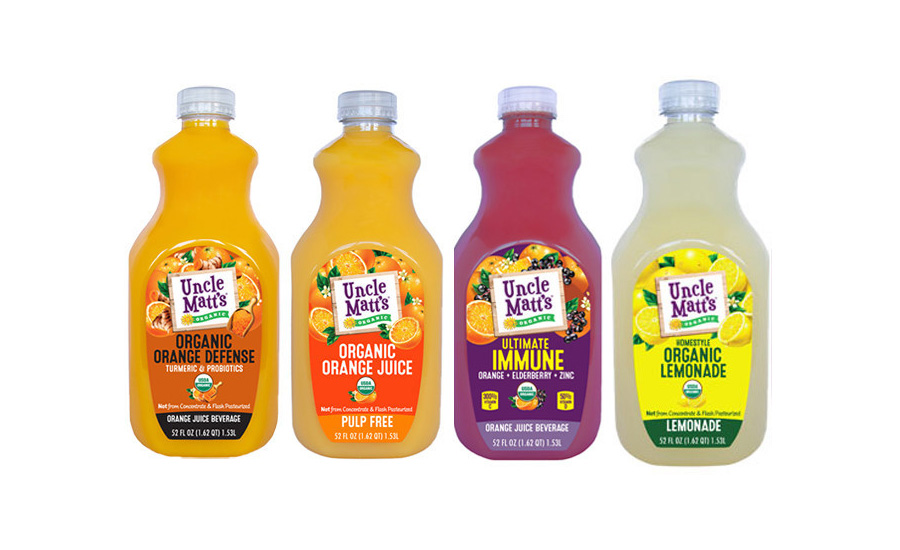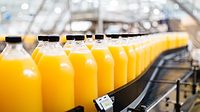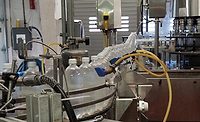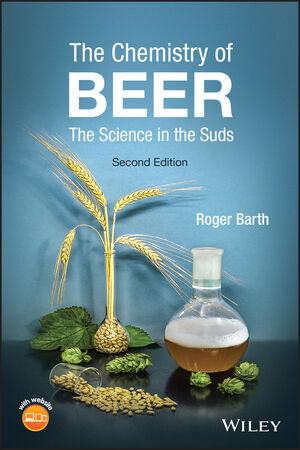Special Report: Contract Packaging
Contract packing business to double to $119B
HPP, healthier functional beverages drive demand for contract manufacturing

This ready-to-drink lemonade was contract packed at Universal Pure’s co-packing facility in Meriden, Conn. The benefits of high-pressure processing (HPP) on juices and juice drinks include food safety, a longer shelf life and cleaner labels, says Tom Woodward.
Image courtesy of Universal Pure
In the 1906 nursery rhyme “Knick Knack Paddy Whack,” repetition is key to helping young children learn to count. The sing-song refrain “with a knick knack, paddy whack, give a dog a bone, this old man came rolling home” also uses alliteration and rhyme to achieve familiarity. In the busy world of contract packaging, familiarity with a customer’s product line, having the right equipment to make, fill, bottle, label, store and distribute beverages, and the ability to manage the entire packaging supply chain enables beverage-makers to get their product ideas to market without all the costly overhead.
Contract packing, or co-packing, allows small, medium and large brands to outsource the packing of their products, which is particularly important in light of the shifting beverage landscape featuring the growth of new age beverages as well as the multitude of craft beverage options. In 2019, the market value of this specialized industry in which products are manufactured by a non-brand-owning independent third party was $52.3 billion, Hamburg, Germany-based Statista states. By 2025, contract packing is forecasted to more than double to nearly $119 billion, it adds.
Allied Market Research paints an even rosier picture of the $3 trillion food and beverage market that is experiencing phenomenal growth, due in part to consumer demand for innovative offerings and healthier products. In fact, the global market for functional food and beverages is expected to reach $255 billion by 2024, which means brands will bring innovative products to market faster than ever, according to the Portland, Ore.-based research firm.

Image courtesy of Brooklyn Bottling Co.
Healthier beverages, functional beverages to support immunity and improve digestive health, and drinks with no or low sugar are among the macro trends affecting the U.S. beverage market. Similarly, these same trends are impacting contracting packing and manufacturing operations.
“There’s more SKUs per line to manage and more ingredients and processes to manage,” explains Eric Miller, president and CEO of Brooklyn Bottling Co., Milton, N.Y. “Everyone from startups to the ‘Big 3’ are using contract packaging. A contract packager can manage a diverse portfolio. For the brand, there is little to no investment other than marketing. Contract packager has economies of scale.”
Tom Woodward, chief commercial officer at Universal Pure, Lincoln, Neb., agrees. “The demand for cleaner-label, fresh and functional beverage categories is a leading indicator to an upsurge in the demand for [high-pressure processing] (HPP) contract packaging and outsourcing,” he says. “This beverage trend has only increased with the continued pandemic, as consumers are seeking added health benefits for nutrition and immunity in what they drink.
“To meet these demands, brands are looking to HPP and partnerships in contract manufacturing for integrated solutions,” Woodward continues. “As previously mentioned, rather than investing in expensive and space consuming bottle filling and HPP equipment, brands are outsourcing both production and HPP services to trusted partners like Universal Pure.”

Image courtesy of Keurig Dr Pepper
Brooklyn Bottling, which contract packs beverages 100% of the time, also is seeing an upsurge in requests for more sophisticated beverage processing including cold-pressed, HPP, ultra-high temperature (UHT) processing (which sterilizes liquid food by heating it above 135 degrees Celsius), and low-acid processing technologies typically used to produce coffee and chocolate drinks.
“Smaller or startup companies do not have critical mass to justify the investment,” Miller says. “Also, larger companies are not yet set up to produce smaller volume and more complicated SKUs.”
The company contract packs energy drinks, organic drinks, soft drinks, fruit beverages and ready-to-drink (RTD) teas on carbonation, chilled, cold-fill and hot-fill production lines.
The array of products undergoing HPP, a cold pasteurization technique in which already sealed products are introduced into a vessel and subjected to a high level of isostatic pressure, is growing and requires specialized equipment, according to Universal Pure’s Woodward.
Among the clean-label benefits of HPP on cold-pressed fruit and vegetable juices — traditionally made using HPP — are food safety, a longer shelf life and the ability to lock in nutrients and freshness.
“Beverage brands outsourcing their production to an HPP contract packager will receive multiple benefits. Such benefits include production efficiencies, consistent product quality, and operational cost savings,” Woodward explains. “By housing bottling and HPP within the same production facility, beverages can be packaged and HPP’d within 24 hours, locking in freshness and retaining product nutritional qualities. This, in addition to the benefits of HPP alone (food safety, shelf-life, cleaner labels, etc.), is a huge advantage of an HPP contract packager.

Image courtesy of JBTAvure
“Further, branded companies can avoid the capital costs related to equipment, and avoid the operational costs related to additional labor, spare parts, etc.,” he continues. “Outsourcing of bottling and HPP allows beverage companies to focus their resources and attention on building and growing their unique brands.”
To meet these demands, Universal Pure is enlarging its geographic footprint and capacity with a transition to a new facility in Arlington, Texas, that will have expanded capacity for HPP and other cold chain related services. Additionally, a new facility in Mira Loma, Calif., officially opened for production in late November and provides value added capabilities such as product tempering, kitting and assembly along with capacity to handle premium beverages.
A boon for beverages
Although beverage entrepreneurs are among the customers for contract manufacturing services, experts highlight that the type of beverage also plays into its contract status. In its October “Private Label Beverages & Contract Packaging in the U.S.” report, Beverage Marketing Corporation (BMC), New York, notes that contract packing volumes can vary dramatically depending on the category. BMC estimates that approximately 15% of all U.S. beverage production, excluding dairy products, is contract packed — a little more than 3.3 billion, 288-ounce cases including chilled products.

Image courtesy of Uncle Matt’s Organic
The report notes that typically most private-label products, including PET bottled water, fruit beverages and carbonated soft drinks (CSDs), are contract packed.
Despite sophisticated production by big domestic brewers like AB InBev, Molson Coors and others, contract packing is vital to the success of specialty craft beer, upping the amount of contract packed beer in the United States. BMC estimates that 11% of the U.S. beer market is contract packed, equating to more than 300 million, 288-ounce size cases, while half of microbrew volume currently is contract packed. “Most of this is done by the major brewers, which are happy to keep their production lines running at close to capacity,” BMC’s report states.
Not surprisingly, the amount of products that are contract packed varies by brand, BMC’s report states. The following are a few highlights of non-alcohol beverages that were contract packed in 2020:
- CSDs — The category is dominated by industry giants whom own the vast majority of their production. Thus, most carbonated soft drinks are not contract packed, with anywhere between 8% to 25% of the market the estimation. Roughly 17% of CSD volume is contract packed in the United States, equating to just under 900 million 288-ounce cases.
- Bottled water — About 5% of the PET bottled water segment is contract packed, which equated to more than 230 million 288-ounce cases. A portion of this volume actually is private label.
- Fruit beverages — Nearly 30% of the fruit beverage market, or 350 million 288-ounce cases, including chilled and shelf-stable products from 100% juice brands Minute Maid and Tropicana is contract packed in the United States. Fruit juice accounted for nearly 200 million cases, while fruit drinks accounted for fewer than 175 million cases.
- Aseptically packaged juices — Because the market for aseptic packaging runs in a variety of sizes, from 125 milliliters to 32 ounces, with most of the volume in single-serve 250-milliliter sizes for children’s juice packaging, brand owners or dairies are generally handing aseptic plastic packaging.
- RTD tea — At 75%, premium, RTD iced teas has the largest percentage of its business produced through contract-packaging arrangements. That’s nearly 560 million, 288-ounce cases of chilled and shelf-stable RTD teas.
- RTD coffee and chocolate drinks — These low-acid beverages pose a unique set of production challenges for processors as there are fewer than 10 facilities with retort capability in the United States. This means that there is very little capacity for contract packaging of aseptic low-acid products in plastic bottles.
- Sports drinks — A quarter of this category, or 194.1 million, 288-ounce cases, are contract packed for smaller independent sports drink brands. This is because the lion’s share of the market is manufactured by three brands, PepsiCo’s Gatorade and Coca-Cola’s Powerade and BODYARMOR, which handle most of their own production.
Quickness, agility required
In today’s ever-changing and evolving market, flexibility, quickness and ingenuity are key attributes to succeed in the HPP outsourcing and contract packaging space, Universal Pure’s Woodward says.
“Universal Pure offers beverage blending, high speed and efficient rotary filling, along with HPP in our Meriden, Conn., facility,” he says. “Further, these same capabilities and services will be incorporated into our new Mira Loma, Calif., facility. We see these integrated bottling and HPP beverage services as a growing part of our portfolio.
“Customer needs change as they expand and identify new opportunities,” Woodward continues. “Universal Pure can pivot quickly to support new customer initiatives and projects. In addition, a robust knowledge of regulatory requirements, operational processes, and product handling is vital to success. Universal Pure is proud of its strong focus on the delivery of safe, high quality and timely products.
Brooklyn Bottling’s Miller prognosticates that the demand for contract packing will expand given the diversity of products and the need for independent co-packers, who can multitask diverse needs. He notes that “service, product quality and storage” are what beverage companies are looking for when it comes to finding the right partner.
“Successful relationships require customer confidence that the contract packager will satisfy volume commitments without jeopardizing quality,” Miller explains. “Also, that the contract packager communicates and is able to adapt, especially during labor and supply issues we are all currently experiencing.”
Miller predicts that newer and more diverse packaging and processes will propel the co-packing industry forward.
Universal Pure’s Woodward agrees that the demand for high quality, safe and fresh foods and beverages will continue to accelerate in growth across diverse applications and channels.
“HPP outsourcing facilities and co-packers will need to pay attention to these ever-evolving trends to meet the diverse needs of their customers,” Woodward says. “At Universal Pure, we’re committed to dedicating the space and resources required to support these evolving trends. We continue to enlarge our geographic footprint and capacity to ensure our customers have the HPP outsourcing and beverage co-packing options to support their growth.”
Looking for a reprint of this article?
From high-res PDFs to custom plaques, order your copy today!







